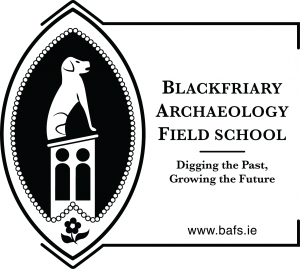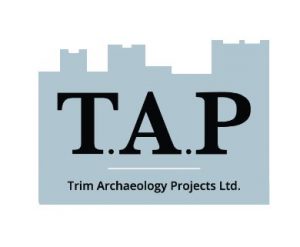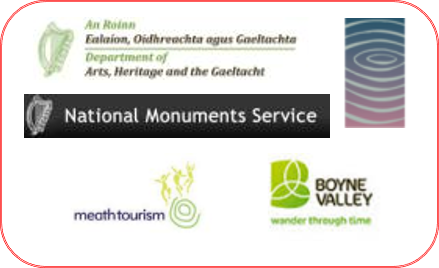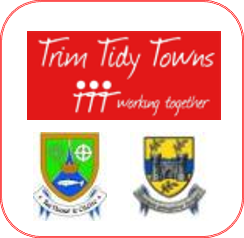Summer 2025
Certificate in Archaeological Excavation and Recording (4 Week) (Accredited Course)
This course will be available to students in June 2025. Students will be introduced to excavation, post-excavation and survey methods. The course is divided between excavation within the friary/friary precinct, post-excavation, recording and survey. Each student will typically spend one week on each element. The excavation, post-excavation and survey sections will be directed and supervised by archaeologists, Finola O’Carroll, Mark McConnon and Laura Corrway.
The objective of this course is to train students in setting out a cutting and tying it to the site grid, the use of various tools, methods of excavation, feature recognition, recording using feature sheets, photography, planning and survey. All students take part in post-excavation processing, including the formation of the written record. The research strategy and previous results which inform the overall excavation plan will be discussed with students, so they can set their work in the overall context of the research framework. Field trips and lectures will introduce the student to the wider landscape and historical context of the Black Friary, and the town of Trim. This course is an accredited program from Dundalk Institute of Technology (https://courses.dkit.ie/index.cfm/page/course/courseId/1321).
At the end of the four-week course students will:
- Understand the theory and practice of archaeological excavation, including the single context recording system, site grid, stratigraphy, and the Harris Matrix.
- Have excavated an archaeological feature.
- Understand how to fill in context sheets, do scaled drawings, take properly set up photographs, take levels, co-ordinates and document these.
- Have received an introduction to the digitisation of site plans and drawings
- Know how to excavate, retrieve, bag and record archaeological objects (artefacts and ecofacts).
- Have carried out basic environmental sampling.
- Understand the process of post-excavation analysis by participating in the work.
- Have processed archaeological finds and know the correct procedures for cleaning and labelling artefacts.
Certificate in Archaeological Excavation and Recording with Osteology (5 Week) (Accredited Course)
Students will be introduced to excavation, post-excavation, survey and bioarchaeology methods. The course is divided between excavation and survey within the friary/friary precinct and post-excavation processing and human skeletal analysis in the on-site lab. Each student will typically spend one week on each element. The excavation, post-excavation and survey sections will be directed and supervised by archaeologists Finola O’Carroll, Mark McConnon and Laura Corrway. The bioarchaeology section of the course is directed by Dr. Rachel Scott.
The objective of the first module of this course is to train students in methods of excavation including feature excavation and recording, the use of various tools, setting out an excavation unit, photography of features, archaeological drawing and survey. The objective of the second module is to train students in post-excavation processes including the washing and cataloguing of finds and samples and the analysis of the human skeletal collection excavated from the site.
The research strategy and previous results which inform the overall excavation plan will be discussed with students, so they can set their work in the overall context of the research framework. Field trips and lectures will introduce the student to the wider landscape and historical context of the Black Friary, and the town of Trim. This course is an accredited program from Dundalk Institute of Technology (https://courses.dkit.ie/index.cfm/page/course/courseId/8609).
Note that previous study of human osteology is not required.
At the end of the course students will:
- Understand the theory and practice of archaeological excavation, including the single context recording system, site grid, stratigraphy, and the Harris Matrix.
- Have excavated an archaeological feature.
- Understand how to fill in context sheets, do scaled drawings, take properly set up photographs, take levels, co-ordinates and document these.
- Have received an introduction to the digitisation of site plans and drawings
- Know how to excavate, retrieve, bag and record archaeological objects (artefacts and ecofacts).
- Have carried out basic environmental sampling.
- Understand the process of post-excavation analysis by participating in the work.
- Have processed archaeological finds and know the correct procedures for cleaning and labelling artefacts.
- Have examined archaeologically derived human remains, comprising both disarticulated bone and articulated burials.
- Have applied techniques of human skeletal analysis, including distinguishing human vs. animal bone, identifying bone fragments, calculating MNI from commingled remains, and reconstructing the biological profile (age, sex, and stature) of individual burials.
- Understand the key components of a human skeletal inventory for an excavation report.
BF Summer 1.1 Intensive course in Fieldwork and Post-Excavation Methods (2 Week ) (Unaccredited Course)
This course will be available to students in June 2025. Students will be introduced to excavation, post-excavation and survey methods. The course is divided between excavation within the friary/friary precinct and post-excavation methods. Each student will typically spend one week on each element. The excavation, post-excavation and survey sections will be directed and supervised by archaeologists, Finola O’Carroll, Mark McConnon and Laura Corrway.
The objective of this course is to train students in setting out a cutting and tying it to the site grid, the use of various tools, methods of excavation, feature recognition, recording using feature sheets, photography, planning and survey. All students take part in post-excavation processing, including the formation of the written record. The research strategy and previous results which inform the overall excavation plan will be discussed with students, so they can set their work in the overall context of the research framework. Field trips and lectures will introduce the student to the wider landscape and historical context of the Black Friary, and the town of Trim.
At the end of the four-week course students will:
- Understand the theory and practice of archaeological excavation, including the single context recording system, site grid, stratigraphy, and the Harris Matrix.
- Have excavated an archaeological feature.
- Understand how to fill in context sheets, do scaled drawings, take properly set up photographs, take levels, co-ordinates and document these.
- Have received an introduction to the digitisation of site plans and drawings
- Know how to excavate, retrieve, bag and record archaeological objects (artefacts and ecofacts).
- Have carried out basic environmental sampling.
- Understand the process of post-excavation analysis by participating in the work.
- Have processed archaeological finds and know the correct procedures for cleaning and labelling artefacts.
Course dates and accreditation:
*Please note there are no pre-requisites for these courses.
| ID | Course Name | Duration | Dates | Credits |
| BF Summer 1.1 | Intensive course in Fieldwork and Post-Excavation Methods | 2 Weeks | Choose Start Dates from: • June 3rd – 13th • July 1st – 11th •July 14th – 25th |
None |
| BF Summer 1.2 | Certificate in Archaeological Excavation and Recording | 4 Weeks | June 3rd – June 27th 2025 | 12.5 ECTS (6 Semester Credit Units) |
| BF Summer 2 | Certificate in Archaeological Excavation and Recording with Osteology | 5 weeks | July 1st – August 1st 2025 | 15 ECTS
(7-8 Semester Credit Units) |
Costs
Below is the list of course fees. Included in the fees are tuition, accommodation, lectures and fieldtrips. International transfers and travel are not included.
| ID | Programme | Course Dates | Cost* |
| BF Summer 1.1 | Intensive course in Fieldwork and Post-Excavation Methods | Choose Start Dates from June 3rd, July 1st and July 14th 2025 | €2,250 |
| BF Summer 1.2 | Certificate in Archaeological Excavation and Recording | June 3rd – June 27th 2025 | €5200 |
| BF Summer 2 | Certificate in Archaeological Excavation and Recording with Osteology | July 1st – August 1st 2025 | €5750 |
How to Apply
Download an application form here: BAFS Student Application Form and send your completed form along with two letters of recommendation to [email protected]
Alternatively, contact us for an application form at [email protected].
Applications are opened until April 30th 2025.







